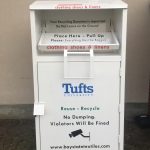I spent my last semester in the beautiful city of Copenhagen, Denmark. I was very excited for the pastries, beautiful scenery and trying the Nordic cuisine. Little did I know how much their sustainability values would amaze me! Through the cold winter, gloomy days, and dark nights – the Danes continued to implement sustainable initiatives. Denmark’s goal is to produce enough renewable energy to cover its total energy consumption by 2050. Impressive!
Denmark prides itself on honing the best companies and creators of technology in the world. As part of my core course, we visited various types of companies in Denmark to understand business strategies in different industries. After visiting some of the larger companies and examining their corporate cultures, it was evident that sustainability was a big part of their business models. A lot of their energy sources depended on wind and solar power.
This value system holds true among the population as well. From toddlers on tricycles to businessmen in suits and old retired couples buying groceries, Denmark is a haven for cyclists. With over 390 kilometers of designated bike lanes, it was no surprise that Copenhagen is officially the first Bike City in the world. Last year it was voted as the “Best city for cyclists” and the “World’s Most Livable City.” The air is fresh, there’s light traffic on the roads, and the population is healthy and happy!
I was fascinated by how committed Copenhagen is to their sustainability goals. To achieve their emissions reduction goal, the country aims to reach a 40% reduction by 2030, and is expected to achieve that rate in certain sectors by 2020. Because of their commitment, Copenhagen has been chosen as the host of the C40 Mayors Summit where delegates from nearly 100 cities around the world will meet to discuss strategies to achieve the goals of the Paris Agreement and limit CO2 emissions.
My personal experience and further research has reinforced my belief that as a community at Tufts we can come together to make our space a cleaner, greener, and healthier one. The biking culture is such a great way to stay healthy and environmentally friendly. An emphasis on using public transport (which is so efficient in Denmark, too!) is another way to stay on track.
I highly recommend studying abroad in Copenhagen. It is a great way to experience a new culture of tremendous environmental commitment first hand!





Find Us On Social Media!